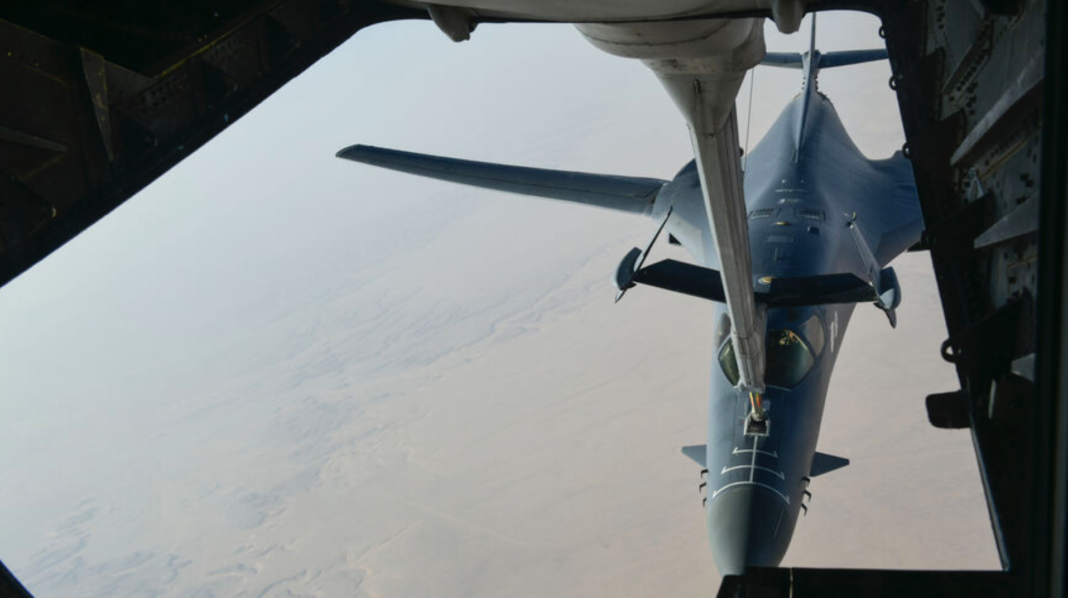The Pentagon’s show of force came as Iran’s top diplomat visited Ankara amid threats by Tehran and its proxies to pile on Israel’s war in the Gaza Strip.
November 1st, 2023, Al-Monitor.
The United States deployed a pair of B-1B Lancer bombers to Turkey’s Incirlik air base on Tuesday for excercises as Israel’s war in Gaza threatens to reshape the Middle East’s geopolitical landscape.
The bombers, launched from the Royal Air Force base at Fairford in the United Kingdom, are assigned to the US Air Force’s 9th Expeditionary Bomb Squadron. The Lancers took part in a “hot-pitting” refueling exercise while on the runway in Turkey, US European Command stated.
The practice enables ground crews to refuel the bombers without pilots disabling the engines for rapid further deployment during wartime missions.
EUCOM said the B-1B deployment was “long-planned” to “demonstrate the US’ readiness” and “showcase the nation’s ability to project US airpower around the globe.” The B-1Bs also trained with Turkish Joint Terminal Attack Controllers, KC-135R refueling tankers and conducted a close air support exercise with Turkish F-16s before departing.
« The refueling of aircraft from Icirlik base has nothing to do with the conflicts in the region, » Turkey’s government said in a statement.
Why it matters: The Pentagon’s rare deployment of long-range B1 bombers to Incirlik comes as Washington seeks to shore up strategic ties with Turkey.
The bombers arrived just a day before Iran’s top diplomat Hossein Amir-Abdollahian visited Ankara to discuss bilateral ties amid Israel’s war against Palestinian militants in Gaza.
Turkey has called for a cease-fire in the conflict and sought to position itself as a potential mediator after the war. Ankara backs the prospect of a future two-state solution to the Israel-Palestine conflict, a model for which the Biden administration has issued renewed statements of support as the war has dragged on.
The United States has vowed unconditional support in the form of military hardware for Israel’s campaign to depose Hamas while warning Iran and the broad front of militias Tehran backs across the Middle East to stay out of the conflict.
Pentagon officials have grown increasingly concerned that Israel’s conduct in the campaign could trigger Iran and its proxies to launch increasingly bolder attacks that could develop into a regional war.
Iran’s government has repeatedly threatened a regional conflagration if Israel does not halt its mounting war effort in Gaza that has killed more than 8,000 Palestinians.
« Everybody loses in a regional war, which is why we’re working through partners with allies — working the phone lines [and] increasing pressure to make clear our desire to prevent regional conflict, » a senior US defense official told reporters Monday on the condition of anonymity.
Allied diplomacy: Following his meeting with Abdollahian, Turkey’s Foreign Minister Hakan Fidan reiterated that Ankara does not want the conflict to spread into a wider regional war, but slammed the United States and European Union’s lack of calls for a cease-fire in Gaza.
Amir-Abdollahian reiterated Iran’s threats while in Ankara on Wednesday and was quoted by Turkey’s state-run Daily Sabah newspaper as saying Israel and the United States « will be responsible if the situation gets out of control as long as the war is not prevented. »
Iran’s proxies have launched more than two dozen rocket and drone attacks on US military positions in Iraq and Syria since Oct. 17. President Joe Biden authorized US airstrikes against facilities used by Iran’s Islamic Revolutionary Guard Corps and associated militias in eastern Syria on Oct. 26 in a bid to deter the attacks.
Biden administration officials have said they will hold Iran accountable for attacks by its proxies, but Defense Secretary Lloyd Austin balked yesterday when pressed by US Senator Lindsey Graham (R-SC) as to whether that meant the US military would be willing to target Iran or Iranian personnel.
“If this doesn’t stop, we will respond,” US Defense Secretary Lloyd Austin. “We will respond at a time and place of our choosing.”
On Tuesday, Yemen’s Houthi rebels launched a barrage of land attack cruise missiles and drones which Israel’s military shot down. It was at least the second such attempted long-range attack targeting Israel by the Iran-armed Yemeni faction since the Gaza war began, but the first its leaders have claimed publicly.
What’s next: US leaders have repeatedly warned Iran and the militias it backs throughout the region not to exploit the Gaza war to launch their own attacks.
By far the most well-equipped and lethal proxy force armed by Iran, Lebanese Hezbollah on Israel’s northern border, has thus far largely stayed out of the conflict. Its leader, Hassan Nasrallah, is expected to give a speech on Friday.

